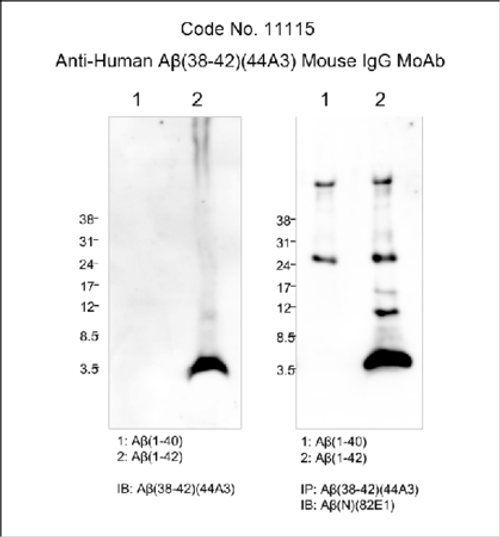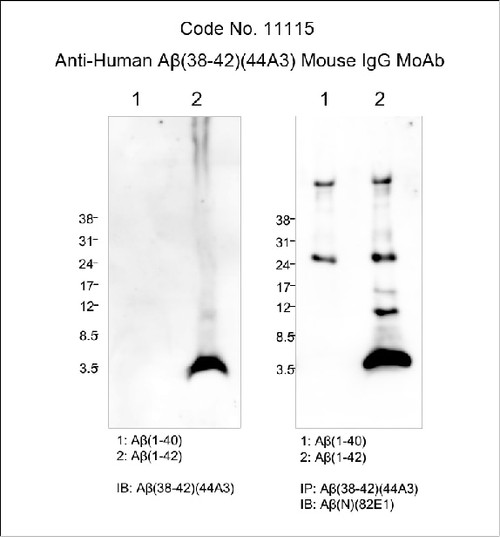-

Amyloid Beta ( 38-42 ) ( 44A3 ) Aβ Anti-Human Mouse IgG MoAb 1
Alzheimer's disease (AD) is characterized by the presence of extracellular plaques and intracellular neurofibrillary tangles (NFTs) in the brain. The major protein component of these plaques is beta amyloid (Aβ) peptide, a 40 to 43 amino acid...
Add to Cart$132.00 -

Amyloid Beta ( 35-40 ) ( 1A10 ) Aβ Anti-Human Mouse IgG MoAb 1
Alzheimer's disease (AD) is characterized by the presence of extracellular plaques and intracellular neurofibrillary tangles (NFTs) in the brain. The major protein component of these plaques is beta amyloid (Aβ) peptide, a 40 to 43 amino acid...
Add to Cart$132.00 -

CD109 (11H3) Anti-Human Mouse IgG MoAb 1
CD109 is a glycosyl-phosphatidyl-inositol (GPI) - anchored glycoprotein about 180 - 190 kDa. It is shown that CD109 is expressed in vascular endothelial cells, some epithelial cells, activated T-cells and platelets, and subset of CD34+ megakaryocytic...
Add to Cart$132.00 -

c-MPL/TPOR (AMM2) Anti-Mouse Rat IgG MoAb 1
Thrombopoietin promotes the growth and differentiation (proliferation) of megakaryocytes which produce platelets. TPOR (Thrombopoietin receptor), which is also called c-MPL (Myeloproliferative leukemia protein) or CD110, is a receptor for thrombopoietin...
Add to Cart$132.00 -

Amyloid Beta E22P ( 11A1 ) Aβ Anti-Human Mouse IgG MoAb 1
Alzheimer’s disease (AD) is characterized by the presence of extracellular plaques and intracellular neurofibrillary tangles (NFTs) in the brain. Aggregation of the 42-mer amyloid β-protein (Aβ42) plays a critical role in the pathogenesis...
Add to Cart$132.00 -

Anti-Smad2L/3L (T220/T179 Phosphorylated) (1A1) Mouse IgG MoAb 1
Phosphorylation of signal transduction molecules, Smad2 and Smad3, can be an important information for understanding of various biological functions of transforming growth factor (TGF)-β. TGF-β type I receptor and cyclin-dependent kinases...
Add to Cart$132.00 -

CEA (1B2) Anti-Human Mouse IgG MoAb 2
The production of CEA is observed in many cancer tissues and the CEA value in the blood reflects tumor size. Therefore, the assay is widely used in a diagnosis and in monitoring of cancer.
Add to Cart$132.00 -

APP (N) (10D1) Anti-Human Mouse IgG MoAb 1
Amyloid precursor protein (APP) is precursor protein of Amyloid β which is major constituent of senile plaque in Alzheimer's disease. It is known that there are three major isoforms, APP695, APP751 and APP770, and are generated from alternative...
Add to Cart$132.00 -

Amyloid Beta ( 38-42 ) ( 44A3 ) Aβ Anti-Human Mouse IgG MoAb
Alzheimer's disease (AD) is characterized by the presence of extracellular plaques and intracellular neurofibrillary tangles (NFTs) in the brain. The major protein component of these plaques is beta amyloid (Aβ) peptide, a 40 to 43 amino acid...
Add to Cart$550.00 -

Reticulocalbin-1 (TMU-6A1) Anti-Human Mouse IgG MoAb
Human Reticulocalbin-1 is a 44kDa protein and belongs to the EF (elongation factor) -hand calcium-binding protein family, and it is known as a luminal protein of endoplasmic reticulum (ER) with the C-terminal HDEL (ER retention signal) sequence. Although...
Add to Cart$550.00 -

c-MPL/TPOR (AMM2) Anti-Mouse Rat IgG MoAb
Thrombopoietin promotes the growth and differentiation (proliferation) of megakaryocytes which produce platelets. TPOR (Thrombopoietin receptor), which is also called c-MPL (Myeloproliferative leukemia protein) or CD110, is a receptor for thrombopoietin...
Add to Cart$550.00 -

ALK (mAb 16-39) Anti-Mouse Rat IgG MoAb
Anaplastic lymphoma kinase (ALK, anaplastic lymphoma kinase) is a receptor type tyrosine kinase, and is found to be expressed in the central and peripheral nervous system at late embryonic stage. Motegi et al. developed an agonist monoclonal antibody...
Add to Cart$550.00

Monoclonal Antibodies
Monoclonal antibodies (mAb or moAb) are derived from a single B-cell parent clone and therefore only recognize a single epitope per antigen.
These B-cells are immortalized by fusion with hybridoma cells, allowing for long-term generation of identical monoclonal antibodies.
Monoclonal antibodies specifically detect a particular epitope on the antigen and therefore are less likely than polyclonal antibodies to cross-react with other proteins.
IBL-America offers a wide range of monoclonal antibodies that can be used in the research and development of multiple laboratory testing applications.
